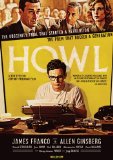| Reviews & Columns |
|
Reviews DVD TV on DVD Blu-ray 4K UHD International DVDs In Theaters Reviews by Studio Video Games Features Collector Series DVDs Easter Egg Database Interviews DVD Talk Radio Feature Articles Columns Anime Talk DVD Savant Horror DVDs The M.O.D. Squad Art House HD Talk Silent DVD
|
DVD Talk Forum |
|
|
| Resources |
|
DVD Price Search Customer Service #'s RCE Info Links |
|
Columns
|
|
|
Howl
THE FILM:
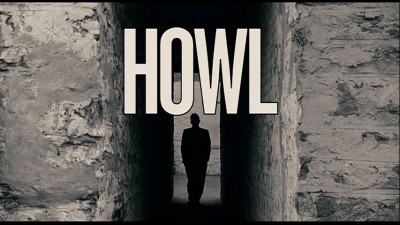
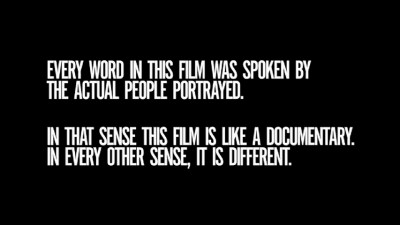
James Franco had quite a good run in 2010. The 32-year-old actor took classes at Yale, hosted an exhibit at the Museum of Contemporary Art in Los Angeles, appeared on General Hospital and 30 Rock and earned Academy Awards buzz for his work in 127 Hours. Franco has become quite the thespian, and his work in Howl, an exploration of American poet Allen Ginsberg's controversial work of the same name, is indicative of his dedication to the craft. The film, like Ginsberg's work, is a performance piece for a certain audience, but Franco's complete dedication to the role is admirable.
Howl is uniquely fragmented in narrative, switching back and forth between scenes of Ginsberg's life in the 1940s and 1950s, his 1955 Six Gallery performance of "Howl," his publisher's 1957 obscenity trial and Ginsberg's subsequent interview, and scenes animating the poem.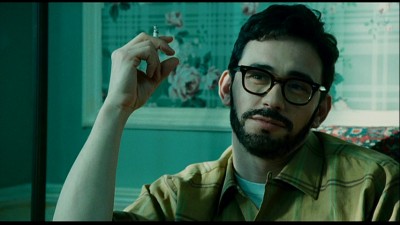 The film presents Ginsberg's struggle as a gay man in an intolerant society, and explores the still-prevalent practice of covering. It is often difficult to figure out everything Ginsberg is mad about, or if he is mad at all. The controversial "Howl" is a swirling vortex of emotion, at once condemning and celebrating war, consumerism, poverty and promiscuity.
The film presents Ginsberg's struggle as a gay man in an intolerant society, and explores the still-prevalent practice of covering. It is often difficult to figure out everything Ginsberg is mad about, or if he is mad at all. The controversial "Howl" is a swirling vortex of emotion, at once condemning and celebrating war, consumerism, poverty and promiscuity.
At the obscenity trial, begun after Lawrence Ferlinghetti published "Howl and Other Poems," witnesses are asked to interpret the poem and decide whether it has any social value. Mary-Louise Parker is on hand as the prosecution's witness condemning the poem as filthy and morally bankrupt. Other witnesses, including the editor of the San Francisco Chronicle, explain that the poem is open to many interpretations, only some of which are overtly sexual.
The big theme in Howl is censorship, an important issue during the 1950s. "Howl" was first released in a period when such frankness was shocking and outrageous to many. The struggle to keep the poem available to the public mirrors the hardships faced by Ginsberg in a time when being gay could be very detrimental to one's success. Despite its lofty themes and important message of tolerance, Howl is less than cohesive as a complete film.
Despite the juxtaposition of several layers of story, I found Howl hard to get into.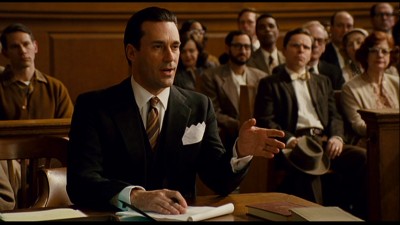 This is not for lack of good performances or a strong production. Franco is Ginsberg, delivering a fantastic theater-grade transformation that is utterly believable. Key supporting players Jon Hamm, as Ginsberg's attorney Jake Ehrlich, David Strathairn, as prosecutor Ralph McIntosh, and Aaron Tveit, as Ginsberg's life partner Peter Orlovsky, are equally strong. Parker and Jeff Daniels are enjoyable in small parts on the witness stand. Directors Rob Epstein and Jeffrey Friedman (The Celluloid Closet) bring an uncomplicated style to the proceedings. But, even at a scant 84 minutes, Howl tends to drag. The level of character development on display is partly to blame. There is enough here to sustain an hour-long short film, but not the feature-length Howl. Although I learned something about the poet from the film, I gained little more than a base understanding of his methods and inspirations.
This is not for lack of good performances or a strong production. Franco is Ginsberg, delivering a fantastic theater-grade transformation that is utterly believable. Key supporting players Jon Hamm, as Ginsberg's attorney Jake Ehrlich, David Strathairn, as prosecutor Ralph McIntosh, and Aaron Tveit, as Ginsberg's life partner Peter Orlovsky, are equally strong. Parker and Jeff Daniels are enjoyable in small parts on the witness stand. Directors Rob Epstein and Jeffrey Friedman (The Celluloid Closet) bring an uncomplicated style to the proceedings. But, even at a scant 84 minutes, Howl tends to drag. The level of character development on display is partly to blame. There is enough here to sustain an hour-long short film, but not the feature-length Howl. Although I learned something about the poet from the film, I gained little more than a base understanding of his methods and inspirations.
The best segments of the film are of the rousing live performance of "Howl" in which Franco madly delivers a very animated reading of the poem. The trial segments are the next strongest, and it is here that the narrative actually moves forward. The animated scenes are the most entertaining but least necessary. Their inclusion feels less like a progression of the story than a tool to keep the audience entertained.
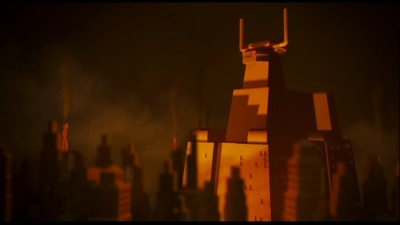
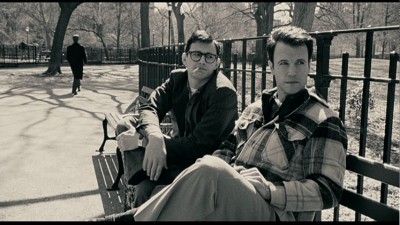
Overall, a mixture of strong parts does not make Howl a satisfying whole. Franco is on a path to acting greatness, and his appreciation for the arts is evident in works like Howl. I commend the film for celebrating tolerance and having an open-minded look at life, but I wish there was more to keep me hooked.
THE DVD:
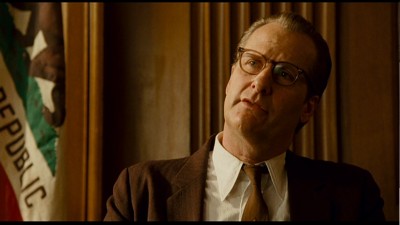
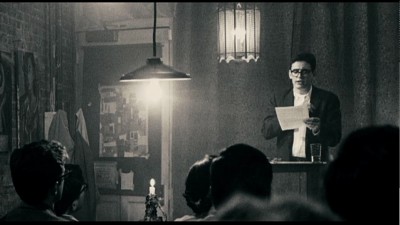
PACKAGING:
Oscilloscope Laboratories continues its practice of presenting its catalog in beautiful, Criterion-esque packaging. Howl is packaged in an attractive cardboard fold-out inside a complementary slipbox. The disc slides into a recessed cut-out.
PICTURE:
Oscilloscope's 1.85:1 anamorphic widescreen transfer is a pleasing replication of the theatrical experience, handing the film's mix of color and black and white sequences with ease. Detail is very strong throughout, something that is complimented by a lack of compression artifacts. The image is deep and textured, with bold colors and sharp accents. The animated sequences are especially striking. A thin layer of grain gives the transfer a film-like structure.
SOUND:
The film's 5.1 Dolby Digital surround track is understated but very competent. Dialogue is crisp and clear, and the film's musical cues are strong. The surround speakers are used for the pleasing score, as well as the busy animated sequences. A 2.0 stereo track and English and French subtitles are also available.
EXTRAS:
Oscilloscope provides a pleasing array of in-depth extra features for Howl. First up is a commentary from Franco and directors Epstein and Friedman. This is a nice track, and it delves into the filmmakers' meticulous research on Ginsberg, supplying a lot of the background information on the poet missing from the film. Holy! Holy! Holy! The Making of Howl (39:58) is an excellent documentary covering the genesis and production of the film. All the key players and many members of the crew provide interviews and are featured in behind-the-scenes footage. Next up are the Directors' Research Tapes (28:32), which highlight the many interviews the directors conducted in preparation for the film. Rounding out the features are Allen Ginsberg's reading of "Howl" at the Knitting Factory (25:29), James Franco's audio-only reading of "Howl" (24:59) and bonus previews. Overall, this is a nice collection of extras.
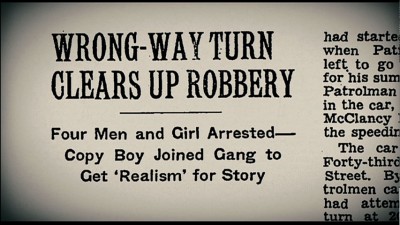
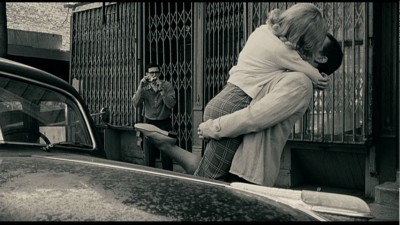
FINAL THOUGHTS:
James Franco is excellent as controversial poet Allen Ginsberg in Howl, which covers the poet's seminal work of the same name. Despite an interesting array of parallel stories and a strong supporting cast, Howl lacks the narrative urgency to make it truly compelling. Oscilloscope's DVD release is excellent, providing great picture and sound and a wealth of extras. Fans of the film will absolutely appreciate the DVD; the uninitiated should Rent It first.
William lives in Burlington, North Carolina, and looks forward to a Friday-afternoon matinee.
|
| Popular Reviews |
| Sponsored Links |
|
|
| Sponsored Links |
|
|
| Release List | Reviews | Shop | Newsletter | Forum | DVD Giveaways | Blu-Ray | Advertise |
|
Copyright 2024 DVDTalk.com All Rights Reserved. Legal Info, Privacy Policy, Terms of Use,
Manage Preferences,
Your Privacy Choices | |||||||









